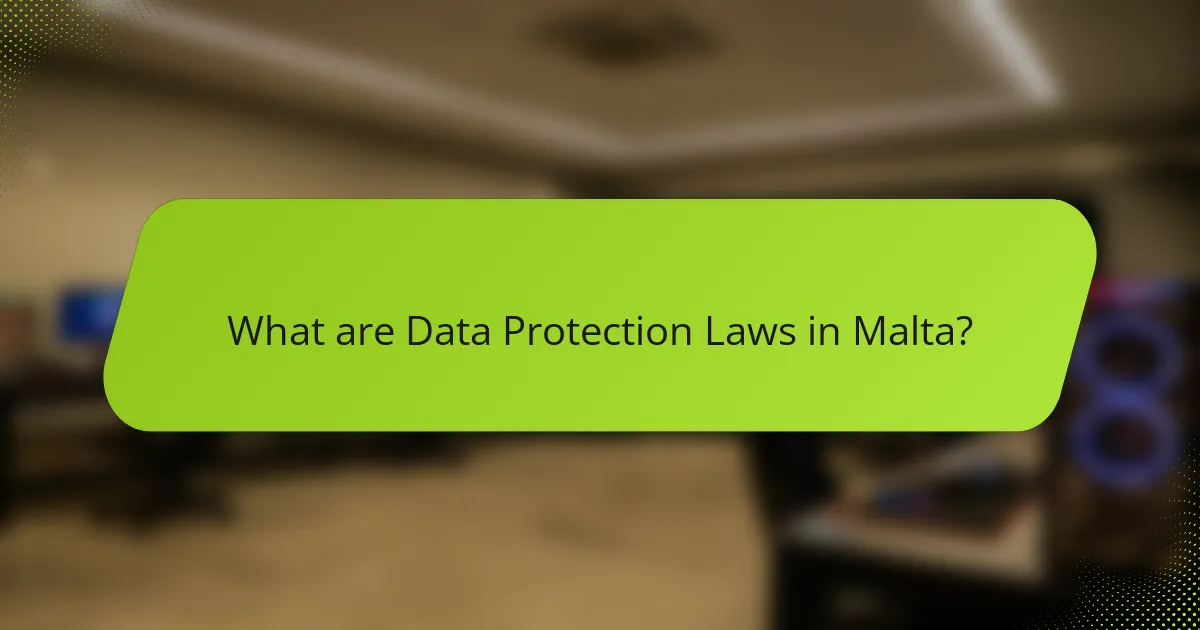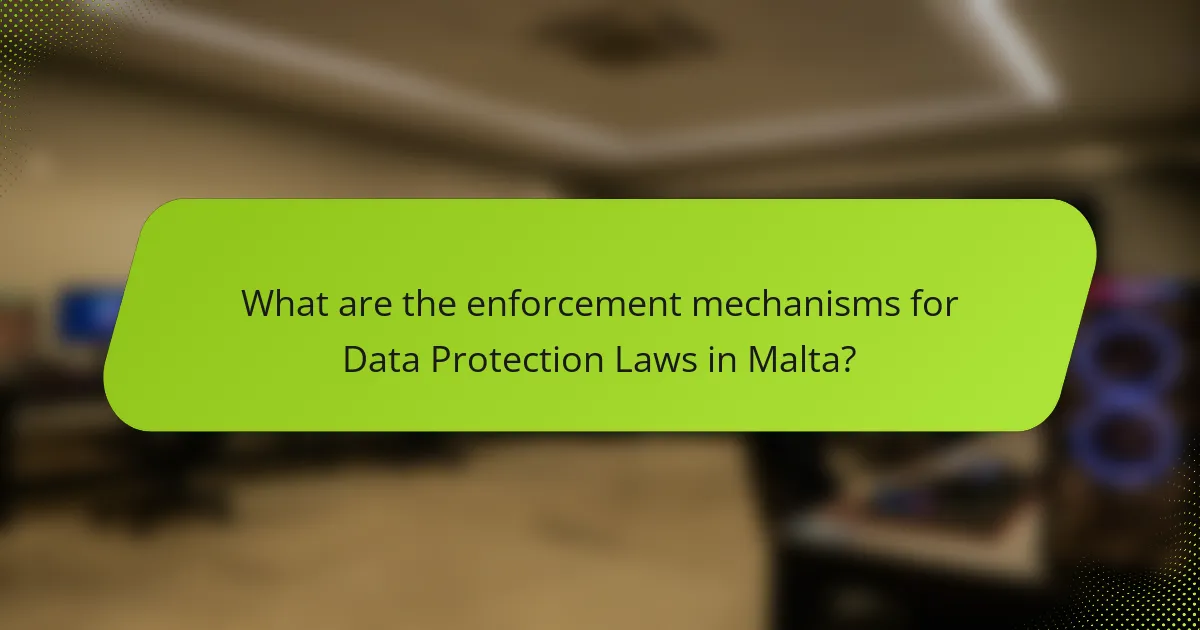
What are Data Protection Laws in Malta?
Data protection laws in Malta are primarily governed by the General Data Protection Regulation (GDPR). GDPR is a comprehensive data protection law that came into effect in May 2018 across the European Union. It provides individuals with rights concerning their personal data and imposes obligations on organizations that process this data. Malta’s Data Protection Authority enforces these laws, ensuring compliance and addressing violations. The laws emphasize principles such as transparency, data minimization, and accountability. Non-compliance can result in significant fines, reflecting the law’s strict enforcement. Malta also has additional local legislation that complements GDPR, ensuring a robust framework for data protection.
How do Data Protection Laws in Malta align with EU regulations?
Data Protection Laws in Malta align closely with EU regulations, particularly the General Data Protection Regulation (GDPR). Malta’s Data Protection Act 2018 implements GDPR provisions into national law. This ensures that data subjects in Malta enjoy the same rights as those in other EU member states. Key aspects include data protection principles, consent requirements, and the rights of access and rectification. The Information and Data Protection Commissioner oversees compliance in Malta, mirroring the role of data protection authorities across the EU. Malta also adheres to the GDPR’s accountability and transparency mandates, reinforcing its commitment to data protection.
What are the key principles of data protection in Malta?
The key principles of data protection in Malta are outlined in the General Data Protection Regulation (GDPR). These principles include lawfulness, fairness, and transparency in data processing. Data must be collected for specified, legitimate purposes and not further processed in a manner incompatible with those purposes. Data minimization is essential, meaning only necessary data should be collected. Accuracy of data is crucial, requiring that personal data be kept up to date. Storage limitation mandates that personal data should be retained only as long as necessary for the purposes it was collected. Lastly, integrity and confidentiality must be ensured through appropriate security measures to protect data against unauthorized access. These principles align with the GDPR, which Malta follows as an EU member state.
How do these principles impact individuals and organizations?
Data protection principles significantly impact individuals and organizations by establishing guidelines for personal data handling. These principles ensure individuals’ privacy rights are respected and protected. For organizations, compliance with these principles fosters trust and enhances their reputation. Non-compliance can lead to severe penalties, including fines and legal actions. The General Data Protection Regulation (GDPR) mandates organizations to implement strict data processing protocols. This regulation requires entities to obtain explicit consent before collecting personal data. Studies show that organizations adhering to data protection laws experience fewer data breaches. Furthermore, individuals are more likely to engage with organizations that prioritize data protection.
Why are Data Protection Laws important for businesses in Malta?
Data protection laws are crucial for businesses in Malta to ensure compliance and safeguard personal data. These laws protect individuals’ privacy rights and establish guidelines for data handling. Non-compliance can lead to significant penalties, including fines up to €20 million or 4% of global turnover under the General Data Protection Regulation (GDPR). Moreover, adhering to these laws enhances customer trust and loyalty, which is vital for business success. Businesses that prioritize data protection can gain a competitive advantage in the market. Additionally, compliance with data protection laws helps mitigate risks associated with data breaches and cyber threats.
What are the potential risks of non-compliance with these laws?
Non-compliance with data protection laws in Malta can lead to significant financial penalties. The General Data Protection Regulation (GDPR) allows fines of up to €20 million or 4% of annual global turnover, whichever is higher. Organizations may also face reputational damage that can impact customer trust. Legal actions from affected individuals can result in costly lawsuits. Non-compliance can lead to mandatory audits and increased scrutiny from regulatory authorities. Additionally, businesses may experience operational disruptions due to compliance investigations. These risks highlight the importance of adhering to data protection laws.
How can compliance enhance business reputation?
Compliance enhances business reputation by establishing trust with customers and stakeholders. Adhering to data protection laws demonstrates a commitment to ethical practices. This commitment can lead to increased customer loyalty and positive brand perception. Companies that prioritize compliance often experience fewer legal issues. Fewer legal issues translate to lower financial risks and liabilities. A strong reputation for compliance can differentiate a business in competitive markets. Studies show that businesses with high compliance standards attract more partnerships and collaborations. Overall, compliance is a strategic asset that enhances credibility and fosters long-term success.

What are the enforcement mechanisms for Data Protection Laws in Malta?
The enforcement mechanisms for Data Protection Laws in Malta include the Office of the Information and Data Protection Commissioner (IDPC). The IDPC is responsible for monitoring compliance with data protection regulations. It has the authority to investigate complaints and conduct audits. The IDPC can issue fines and sanctions for violations. Additionally, individuals have the right to seek legal remedies through the courts. The General Data Protection Regulation (GDPR) also applies, providing a framework for enforcement across the EU. These mechanisms ensure accountability and protection of personal data in Malta.
Who is responsible for enforcing Data Protection Laws in Malta?
The Information and Data Protection Commissioner is responsible for enforcing Data Protection Laws in Malta. This authority ensures compliance with the General Data Protection Regulation (GDPR) and local data protection legislation. The Commissioner has the power to investigate complaints and impose fines for violations. The office also provides guidance and support to organizations on data protection practices. This enforcement mechanism is crucial for safeguarding personal data rights in Malta.
What role does the Information and Data Protection Commissioner play?
The Information and Data Protection Commissioner oversees compliance with data protection laws in Malta. This role includes monitoring how personal data is processed by organizations. The Commissioner also enforces regulations to protect individuals’ privacy rights. They investigate complaints regarding data breaches and non-compliance. Additionally, the Commissioner provides guidance on best practices for data handling. This ensures organizations understand their responsibilities under the law. The Commissioner plays a crucial role in promoting transparency and accountability in data processing. Their work helps maintain public trust in how personal information is managed.
How are violations investigated and penalized?
Violations of data protection laws in Malta are investigated by the Office of the Information and Data Protection Commissioner (IDPC). The IDPC receives complaints from individuals or organizations regarding potential violations. Upon receiving a complaint, the IDPC conducts an initial assessment to determine if there is sufficient evidence to warrant a formal investigation. If a formal investigation is initiated, the IDPC gathers evidence, which may include documents, testimonies, and interviews with relevant parties.
Penalties for violations can include administrative fines, which are determined based on the severity of the violation. Fines can range significantly, with maximum penalties reaching up to €20 million or 4% of the annual global turnover of the offending entity, whichever is higher. The IDPC also has the authority to impose corrective measures, such as requiring the offending entity to cease processing activities or to comply with specific data protection requirements.
The enforcement of these penalties is backed by the General Data Protection Regulation (GDPR), which provides a legal framework for data protection across the European Union, including Malta. The IDPC’s role in enforcement ensures compliance with these regulations and the protection of individuals’ data rights.
What types of penalties exist for non-compliance?
Penalties for non-compliance with data protection laws in Malta include fines, administrative sanctions, and legal actions. The General Data Protection Regulation (GDPR) allows fines up to €20 million or 4% of annual global turnover, whichever is higher. Administrative sanctions can involve warnings or reprimands for first-time offenses. Legal actions may include compensation claims from affected individuals. The Data Protection Authority in Malta enforces these penalties to ensure compliance. Non-compliance can also lead to reputational damage for organizations.
What factors influence the severity of penalties imposed?
The severity of penalties imposed under data protection laws is influenced by several key factors. These factors include the nature and gravity of the violation. For instance, breaches involving sensitive personal data typically incur harsher penalties. The level of negligence or intent behind the violation also plays a significant role. Intentional violations often lead to more severe consequences compared to accidental breaches.
The impact of the violation on individuals is another critical factor. If the breach results in significant harm to individuals, penalties may be increased. Additionally, any previous violations by the same entity can lead to escalated penalties due to a pattern of non-compliance. The response of the entity to the breach is also considered. Prompt and effective remedial actions can mitigate penalties, while a lack of cooperation may exacerbate them.
Regulatory guidelines and the discretion of enforcement authorities further influence penalty severity. In Malta, the Data Protection Authority evaluates these factors when determining penalties. The General Data Protection Regulation (GDPR) establishes a framework that guides the imposition of fines, emphasizing proportionality and deterrence in its enforcement.
How can organizations appeal against enforcement actions?
Organizations can appeal against enforcement actions by submitting a formal appeal to the relevant supervisory authority. This process typically involves detailing the grounds for the appeal, which may include procedural errors or misinterpretations of the law. Organizations must adhere to specific timelines for submitting appeals, often outlined in the enforcement notice. The appeal should include supporting evidence and documentation to substantiate the claims made. In Malta, organizations can refer to the Data Protection Commissioner’s guidelines for detailed procedures. Additionally, organizations may seek legal advice to strengthen their appeal. This structured approach ensures that the appeal is considered in accordance with data protection regulations.

What are the best practices for ensuring compliance with Data Protection Laws in Malta?
Best practices for ensuring compliance with Data Protection Laws in Malta include conducting regular data audits. Organizations should assess data processing activities to identify compliance gaps. Implementing data protection policies is essential. These policies should align with the General Data Protection Regulation (GDPR) requirements. Training staff on data protection principles is crucial. Employees must understand their roles in safeguarding personal data. Establishing a clear data breach response plan is necessary. This plan should outline steps to take in case of a data breach. Regularly reviewing and updating privacy notices is important. These notices should clearly inform individuals about their rights and how their data is used. Engaging with the Office of the Information and Data Protection Commissioner can provide guidance. This engagement helps organizations stay informed about regulatory changes and best practices.
How can organizations implement effective data protection strategies?
Organizations can implement effective data protection strategies by conducting thorough risk assessments. This helps identify vulnerabilities in data handling processes. They should also establish clear data governance policies. These policies define roles and responsibilities regarding data security.
Training employees on data protection best practices is essential. Regular training sessions ensure staff are aware of potential threats. Organizations must also utilize encryption for sensitive data. This adds an extra layer of security against unauthorized access.
Implementing access controls restricts data access to authorized personnel only. Regular audits of data protection measures help detect any weaknesses. Additionally, organizations should stay updated on data protection laws and regulations. Compliance with legal standards is crucial for effective data protection.
What are the key components of a data protection policy?
Key components of a data protection policy include data collection guidelines, data usage protocols, and data retention schedules. Data collection guidelines specify what information is collected and how it is obtained. Data usage protocols outline how the collected data can be utilized and shared. Data retention schedules define how long data is stored and the criteria for its disposal. Additionally, the policy should include data security measures to protect against unauthorized access. It must also address user rights, such as the right to access and rectify personal data. Compliance with relevant laws, such as the General Data Protection Regulation (GDPR), is essential for validity. Regular audits and updates to the policy ensure ongoing compliance and effectiveness.
How can staff training contribute to compliance?
Staff training enhances compliance by ensuring employees understand data protection laws. It provides essential knowledge about legal obligations and organizational policies. Employees who are well-trained are more likely to follow procedures correctly. This reduces the risk of data breaches and legal penalties. For example, organizations with comprehensive training programs see a 50% reduction in compliance violations. Regular training updates keep staff informed about changes in regulations. This proactive approach fosters a culture of accountability and responsibility. Ultimately, informed employees contribute to a compliant organizational environment.
What tools and resources are available for organizations in Malta?
Organizations in Malta have access to various tools and resources for data protection compliance. The Office of the Information and Data Protection Commissioner (IDPC) provides guidance and support for organizations. They offer resources such as templates, guidelines, and training programs tailored to local regulations. The European Union Agency for Cybersecurity (ENISA) also offers tools and best practices relevant to data protection. Additionally, organizations can utilize legal consultancy services specializing in Maltese data protection laws. Workshops and seminars hosted by local associations further enhance understanding of compliance requirements. These resources ensure organizations can effectively navigate Malta’s data protection landscape.
How can technology assist in data protection compliance?
Technology assists in data protection compliance by automating data management processes. It enables organizations to efficiently track and manage personal data. Tools like encryption protect sensitive information from unauthorized access. Compliance software helps ensure adherence to regulations such as GDPR. Data loss prevention solutions monitor and control data transfers. Regular audits can be automated to assess compliance status. Additionally, training platforms can educate employees about data protection practices. These technological solutions collectively enhance an organization’s ability to meet legal requirements.
What are the benefits of engaging with legal experts in data protection?
Engaging with legal experts in data protection provides crucial benefits for organizations. Legal experts ensure compliance with complex regulations, such as the General Data Protection Regulation (GDPR). They help mitigate risks associated with data breaches, which can lead to significant fines. Expert guidance aids in the development of robust data protection policies. This minimizes the likelihood of legal disputes related to data handling. Additionally, they provide training for staff on best practices in data protection. This enhances overall organizational awareness regarding data privacy. Legal experts also assist in navigating cross-border data transfer issues, ensuring lawful practices.
What practical steps can businesses take to enhance data protection?
Businesses can enhance data protection by implementing robust security measures. They should conduct regular risk assessments to identify vulnerabilities. Encrypting sensitive data protects it from unauthorized access. Implementing strong access controls limits data exposure. Regularly updating software and systems mitigates security risks. Training employees on data protection practices promotes a security-aware culture. Establishing an incident response plan prepares businesses for data breaches. Finally, complying with data protection regulations ensures legal adherence and builds trust.
Data Protection Laws in Malta are primarily governed by the General Data Protection Regulation (GDPR), which establishes rights for individuals regarding their personal data and obligations for organizations that process this data. The article outlines the alignment of Malta’s laws with EU regulations, key principles of data protection, and the impact on individuals and organizations. It also discusses the enforcement mechanisms, including the role of the Information and Data Protection Commissioner, potential penalties for non-compliance, and best practices for organizations to ensure compliance. Additionally, it highlights the importance of engaging with legal experts and utilizing technology to enhance data protection strategies.
